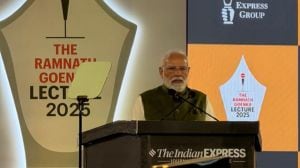Hindu chief justice of Pakistan
Under the Constitution of Pakistan, anytime the office of the chief justice of Pakistan is vacant...

Under the Constitution of Pakistan, anytime the office of the chief justice of Pakistan is vacant, the most senior of the other judges of the Supreme Court may be appointed to act as chief justice. Justice Bhagwan Das is the senior-most judge. He has a fine judicial record and is highly respected. Opposition in some quarters to his appointment as acting chief justice on the ground that he is a Hindu is baseless.
Justice Cornelius, one of the most distinguished chief justices of Pakistan, was a non-Muslim. That apart, there is no requirement in Article 177(2) of the Pakistan Constitution that the judge to be appointed should be a Muslim. A non-Muslim is not disqualified for being appointed as a judge or a chief justice. This is in sharp contrast to Article 41(2), which stipulates that a person “shall not be qualified for election as president unless he is a Muslim.”
Besides the oath of office to be taken by the president requires him “to solemnly swear that I am a Muslim …” The same is the position in the case of the prime minister. There is no similar provision in the oath of office of the chief justice or a judge of the Pakistan Supreme Court. The apprehension that a non-Muslim may act as the president when the office of the president becomes vacant for any reason or the president is unable to perform his functions is unfounded. In these contingencies the speaker of the National Assembly or the chairman, not the chief justice, can function as the acting president.
The establishment of the Federal Shariat Court and its composition also does not disentitle a non-Muslim from being appointed as a chief justice of Pakistan or chief justice of the Federal Shariat Court. The oath of office also does not require the person to swear that he is a Muslim. Opposition to Justice Bhagwan Das’s appointment as the acting chief justice stems from the mistaken notion that a non-Muslim cannot be well-versed in Islamic law and its interpretation. It is overlooked that under Article 203(E)(7) the Shariat Court can invite any person in Pakistan or from abroad whom the court considers to be well-versed in Islamic law to appear before it and render assistance. Religion and politics should have no role to play in the appointments of judges to the Supreme Court and high courts of Pakistan.
Monkey jurisprudence
Our judiciary is concerned not only with human rights. The Delhi High Court in a PIL involving the monkey menace to Delhiites directed civic authorities and the government to shift all stray monkeys to a new sanctuary at Bhati Mines near Asola in south Delhi. It also directed the municipal authorities to continue the recently initiated measure of imposing fine on those offering food to stray monkeys. So far, so good. The high court further directed the authorities to sterilise 25 per cent of monkeys trapped for shifting to Bhati Mines. Out of solicitude for the simians, the court emphasised that sterilisation shall be done only on healthy monkeys and by use of proper equipment while ensuring that they do not suffer from any infection or medical complication as a result of the sterilisation. These directions are highly problematic.
A state law providing for the sterilisation of persons convicted two or more times of felonies involving moral turpitude was invalidated by the US Supreme Court on the ground that the right to reproduce is “one of the basic civil rights of man”. Can the principle of this decision not be extended to monkeys? Do they not have the same basic reproductive rights? It is likely there will be an appeal from the high court judgment to the Supreme Court which will then have a historic opportunity to deal with the issue — whether sterilisation is violative of animal rights, and particularly the basic right of monkeys who are held in deep reverence by many. Our judiciary is truly unique and can be expected to make an invaluable contribution to monkey jurisprudence.



- 01
- 02
- 03
- 04
- 05




























